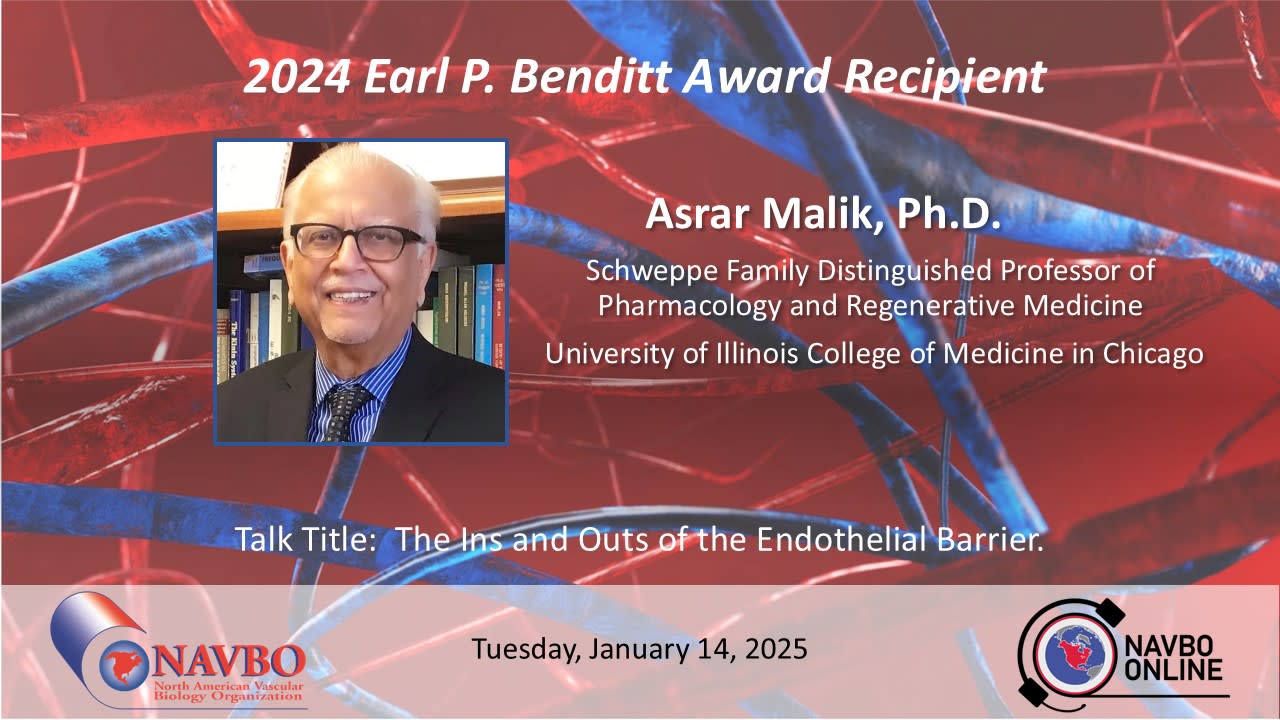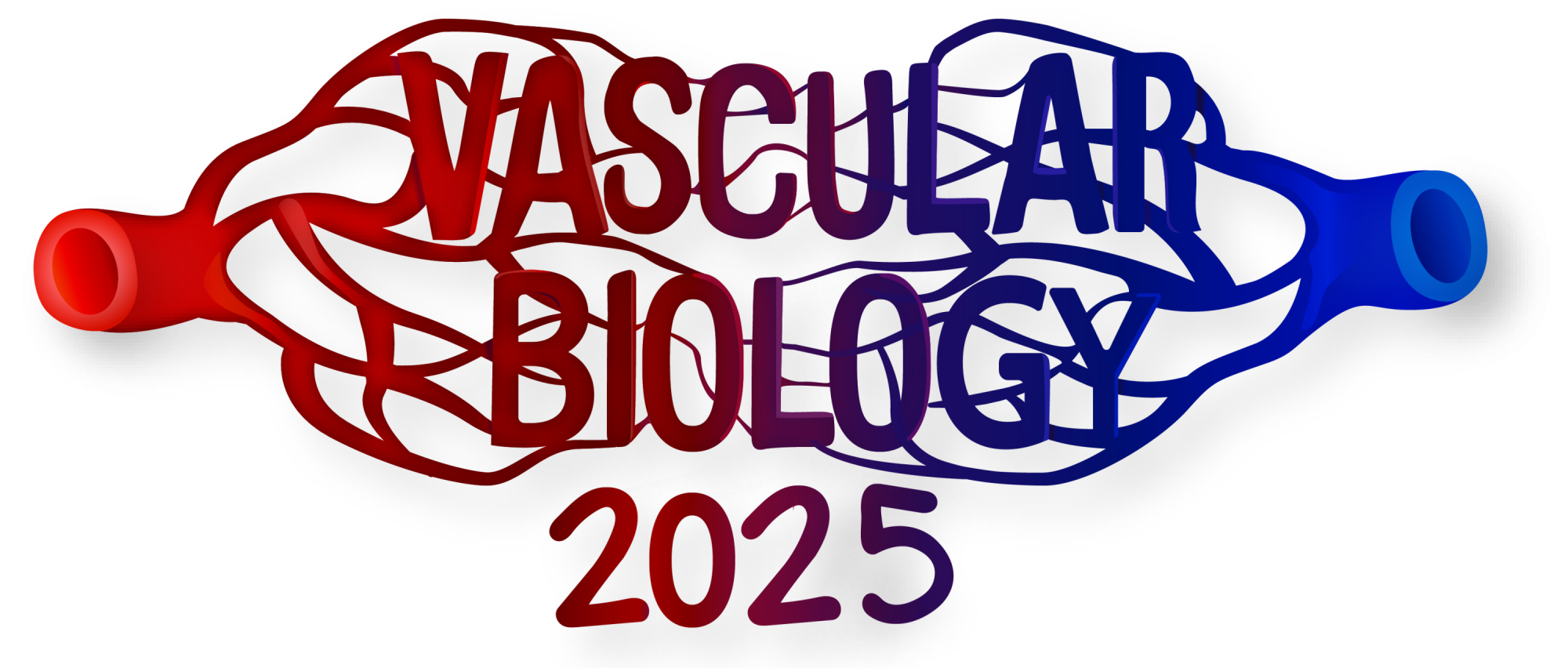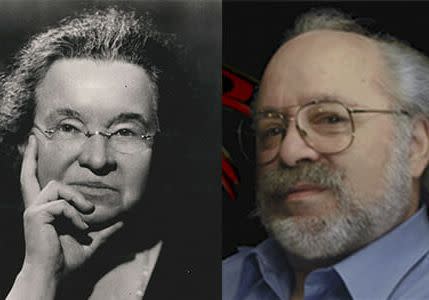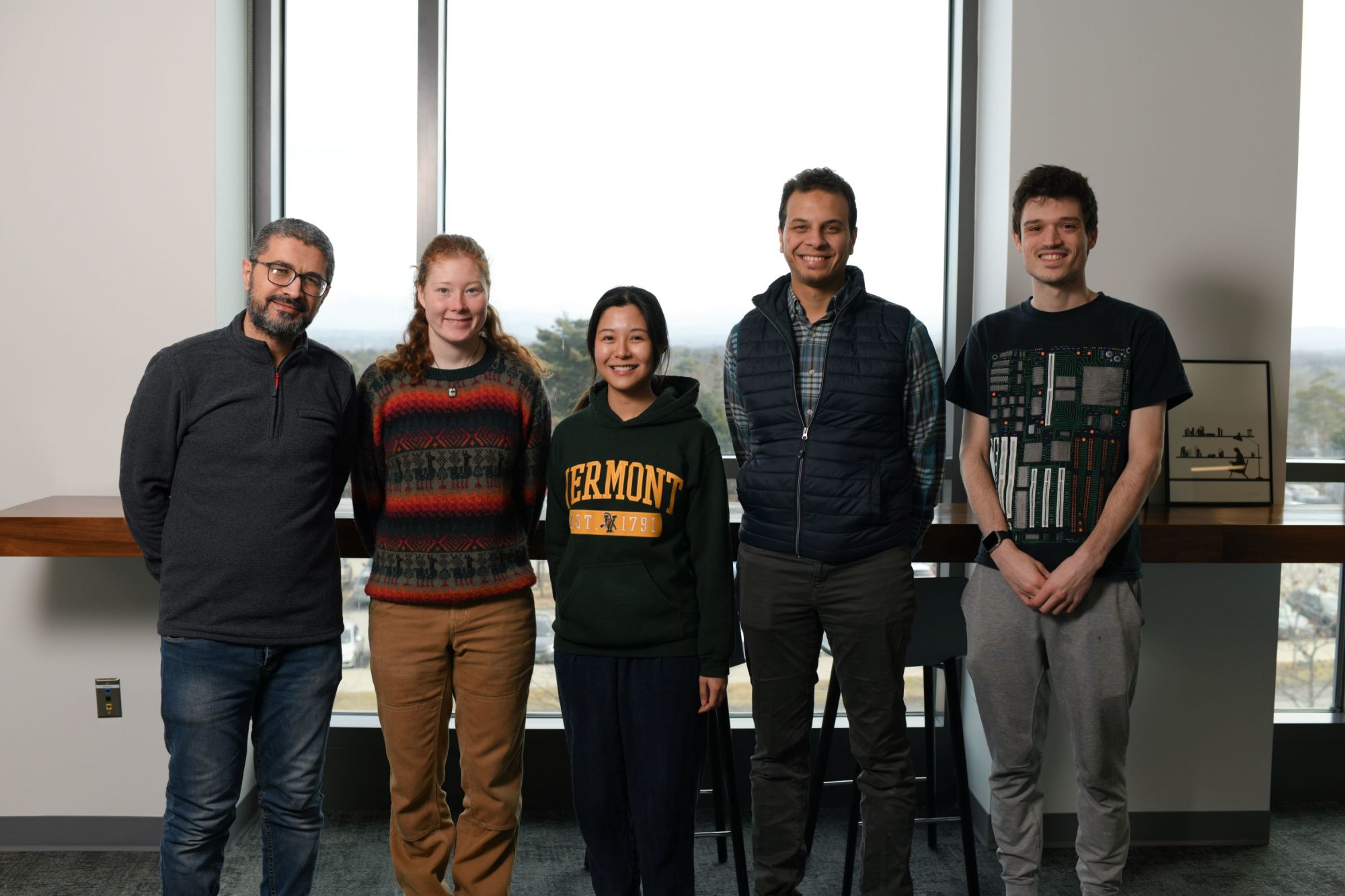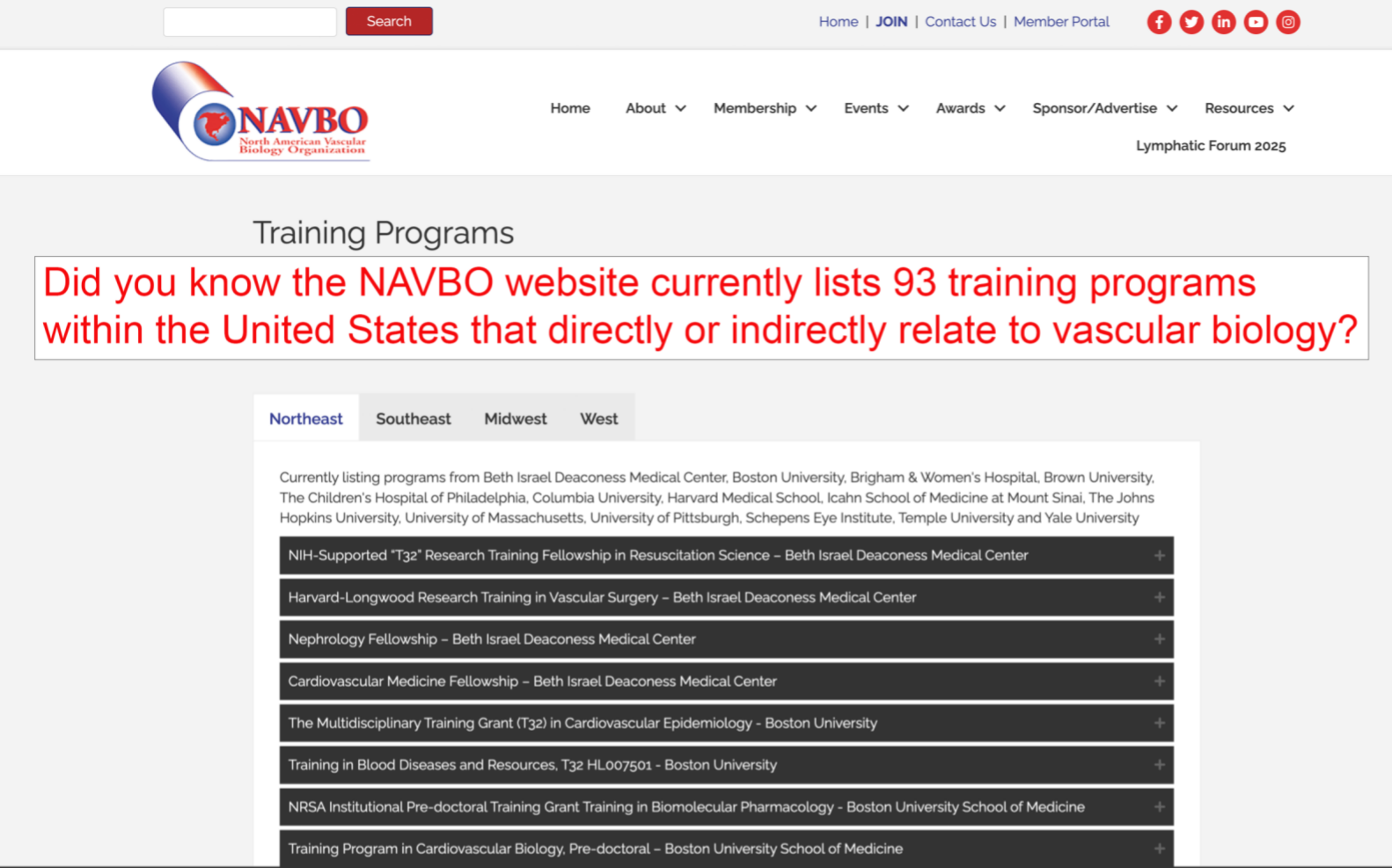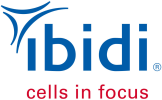|
|
|
|
January 2025 |
|
2024 Benditt Award Lecture |
|
|
Dr. Asrar Malik, the 2024 Earl P. Benditt Award Recipient, presented his lecture "The Ins and Outs of the Endothelial Barrier" on Tuesday, January 14. Dr. Malik is the Schweppe Family Distinguished Professor of Pharmacology and Regenerative Medicine, University of Illinois College of Medicine in Chicago. If you missed this inspiring lecture, please click here to register. A link to the recording will be in your confirmation email. |
|
Mechanotransduction Workshop |
|
|
Registration is open through February 26 Join organizers, Martin Schwartz, Yale University and Ellie Tzima, Oxford University as they lead us through a virtual conference entitled, "Mechanotransduction in Vascular Biology and Disease Workshop"
|
|
stress and blood pressure influenced artery physiology and remodeling.
The full program is available on our web site at http://navbo.org/mechano |
|
NAVBO Conferences in 2025 |
|
June 12-14, 2025 at Northwestern University |
|
July 7-10, 2025 at the |
|
October 19-23, 2025 at |
|
Seeking VB2026 Pre-conference Meeting Organizers |
|
For Trainee Members Only Are you interested in organizing the Pre-Conference Meeting for Trainees at Vascular Biology 2026? NAVBO has been holding this trainee-led session since 2015 and the program and has often included a featured speaker, panel discussion, career development and/or a social time with refreshments but most importantly, presentations of several abstracts authored by postdocs and graduate students (these authors will be presenting posters during the main portion of the meeting).
If you are interested in organizing the 2026 four-hour session for trainees that will kick off Vascular Biology 2026 (NAVBO’s Annual Meeting), please complete the online form.
The meeting will be held at the Asilomar Conference Grounds in Pacific Grove, CA from October 18 - 22, 2026.
The meeting organizers will review the applications and select the trainee organizers. Applications are due March 1, 2025 |
|
Thank you for your Contribution! |
|
We'd like to thank our members for their generous contributions to our 2024 Giving Tuesday Campaign: Brian Coon, Oklahoma Medical Research Foundation (OMRF) Linda Demer, UCLA School of Medicine Nicholas Gale, Retired Mallika Ghosh, University of Connecticut Health Center Michael Gimbrone, Harvard Medical School/Brigham & Women's Hospital Lian-Wang Guo, University of Virginia Rafael Rubio, University of Virginia Carrie J. Shawber, Columbia University Medical Center Tong-You Wei, University of California, San Diego Youyang Zhao, Northwestern Univ-Lurie Children's Hospital of Chicago Plus other generous members who wish to remain anonymous.
Thank you!!
These funds, nearly $10,000 will be used to support the NAVBO Education Committee's High School Video Program. The first module, Introduction to Vascular Biology, is complete and we are now working on the second module, Embryonic Vascular Development. This program will be freely available to high school students, their teachers and anyone interested in vascular biology including undergraduate students to round out their basic biology studies. |
|
Call for Nominations |
|
|
We are seeking nominations from the membership for the 2025 Stephen Schwartz and Florence Sabin Awards, which will be presented at Vascular Biology 2025 in October. Nominations are due March 15, 2025. |
|
Lab of the Month |
|
|
Month - January 2025 The Lab of Dr. Osama Harraz This month we are highlighting the lab of Dr. Osam Harraz, Assistant Professor at the University of Vermont. Find out more about his lab by visiting his page in our Lab of the Month listing. |
|
Call for Volunteers |
|
Institutional Representatives If you are interested in helping promote NAVBO membership and our various meetings and activities at your institution, contact Bernadette (bernadette@navbo.org). Brochures, flyers, postcards, etc. are mailed to representatives, who are asked to distribute these within their institution or organization.
|
|
Did You Know...? |
|
Spotlight on Trainees |
|
“Change is inevitable; growth is optional” Upcoming changes to NIH Fellowship programs (the “F” series) will seek to broaden the range of candidates and research training contexts that are recognized as meritorious. For example, fellowship mentors are no longer required to have had NIH support or extensive mentoring experience. A webinar titled An Introduction to the NIH Fellowship Program for Prospective Candidates will be held February 11, 2025, 10:00–11:30 AM ET, to discuss NIH’s fellowship opportunities, application components, the peer review process, and what constitutes a competitive application. Register here to reserve a virtual seat; a recording of the event will also be available afterwards. |
|
Member News |
|
Welcome to our New Members: Mannthalah Abubaker, University of Calgary Bulbul Ahmed, Boston University School of Medicine Fahad, Alkhalfan, Cleveland Clinic Jerome Breslin, University of South Florida School of Medicine Mengmeng Chang, University of South Florida Morsani College of Medicine Thomas Gast, Indiana University Bloomington Aaron James, Johns Hopkins University Jie Jiao, University of British Columbia Molly Kelly-Goss, University of California, San Francisco Soo Jin Kim, Asan Medical Center, University of Ulsan College of Medicine Julia Kraxner, Max Delbrück Center for Molecular Medicine Teri Lansdell, University of Virginia - Cardiovascular Research Center Catherine Léon, INSERM - EFS Bin Liu, Washington University in St. Louis Vedanta Mehta, University of Oxford Ivan Mark Olfert, West Virginia University Sarah Najophe, University of Sao Paulo Tomasz Nawara, MDC Pratima Prabala, University of California, Irvine Fernanda Priviero, University of South Carolina Rinaldo Rodrigues, University of South Carolina SOM Lakshmi Santhanam, Johns Hopkins University SOM Sun-sang J Sung, University of Virginia Hans Van Oosterwyck, KU Leuven Diana Velasco, University of South Carolina SOM Min Wang, University of Pennsylvania Stephanie Wilczynski, University of South Carolina SOM |
|
Recent Member Publications |
|
Myeloid DRP1 deficiency limits revascularization in ischemic muscles via inflammatory macrophage polarization and metabolic reprogramming Journal of Clinical Investigation Insight Macrophages play a crucial role in promoting perfusion recovery and revascularization after ischemia through antiinflammatory polarization, a process essential for the treatment of peripheral artery disease (PAD). Mitochondrial dynamics, particularly regulated by the fission protein DRP1, are closely linked to macrophage metabolism and inflammation. However, the role of DRP1 in reparative neovascularization remains unexplored. Read More
If you recently published a paper and would like to have it included in a future issue of the NAVBO NewsBEAT and/or on our web site. Please send the citation to membership@navbo.org |
|
Industry News |
|
Facilitating the federal funding process via Simpler.Grants Efforts are underway at HHS to modernize Grants.gov, simplifying the process of finding and responding to federal funding opportunities. Simpler.Grants.gov is a work in progress, with new features and updates to be based on community feedback. Users can subscribe to the Simpler Grants newsletter to stay informed of future enhancements to search functions and other features. As new versions are released, functional software can be test-driven and commented upon – what works, what can be improved, and what should happen next.
Uncertain paths ahead for biomedical research as the White House changes tenants Writing for NBC News, Megan Lebowitz reports that President-elect Trump apparently has reconsidered his formerly negative view of H-1B worker visas, which allow employers to temporarily hire non-U.S. citizens for highly skilled jobs. The first Trump administration implemented rules, ultimately struck down in court, that annually would have cut the number of H-1B visas issued. Protection of the H-1B program is welcome news to international students and other trainees in biomedical research, as well as their supervisors and home institutions.
Progress in heart xenografting Investigators from the University of Maryland, Johns Hopkins, and Revivicor, Inc., recently have reported in Communications Medicine their findings on transplant of hearts from genetically-modified pigs into non-human primates, assessing early cardiac xenograft immune toleration and duration of xenograft survival. Ten gene-edited cardiac xenografts provided life-supporting function up to 225 days in the primate model. Xenograft histology revealed limited markers of rejection. This pre-clinical work formed the basis for FDA approval for the compassionate use transplants in two patients that has occurred in the last few years. |
|
Journal Club |
|
The NAVBO Education Committee, organizers of our monthly Journal Club, is seeking postdocs and students to present recently published research papers on vascular sciences and adjacent interdisciplinary sciences! Improve your presentation skills and practice the critical evaluation of a paper in a friendly setting!
|
|
Call for Papers |
|
|
Immunity, Atherosclerosis and Cardiovascular Disease: An Interdisciplinary Approach to Cardiometabolic Health Editors: Masanori Aikawa, Jürgen Bernhagen, Gabrielle Fredman, Carlos Labarrere, and Holger Winkels NAVBO is sponsoring this Research Topic through our partnership with Frontiers In Cardiovascular Medicine.
Led by an interdisciplinary team of topic experts, this Research Topic will delve into the role of inflammation as a key mechanism in atherosclerotic vascular diseases. A specific focus is placed on how various inflammatory mediators contribute to atherosclerotic lesion formation, propagation, and plaque instability. Specific areas of interest are listed on the web page. https://www.frontiersin.org/research-topics/65457/immunity-atherosclerosis-and-cardiovascular-disease-an-interdisciplinary-approach-to-cardiometabolic-health
The deadline for manuscripts is January 31, 2025. |
|
|
|
|
The collection focuses on phenotypic transitioning of vascular and immune cells, such as endothelial-to-mesenchymal transitions with specific emphasis on the role of immune and inflammatory responses in vascular remodeling, genetic and epigenetic factors, environmental and lifestyle factors, personalized medicine approaches and the interplay between biomechanical forces and endothelial health in vascular remodeling. Editors: Drs. Laena Pernomian (University of South Carolina) and Vanessa de Fátima Borges (Cedars Sinai Medical Center, Los Angeles). Submission deadline: March 12, 2025. |
|
|
|
cThe collection examines the interplay between perivascular adipose tissue (PVAT) and vascular endothelium, particularly in the context of energy imbalance, PVAT's secretome and mechanical properties. The potential of PVAT as a therapeutic target and/or a source of diagnostic biomarkers for cardiovascular diseases are also of particular interest. Editors: Drs. Eduardo Nava (University of Castilla-La Mancha, Ciudad Real, Spain), Maria Andreia Delbin (State University of Campinas, Campinas, Brazil), Ning Xia (Johannes Gutenberg University Mainz, Mainz, Germany) and Stephanie Watts (Michigan State University, East Lansing, USA). Submission deadline: May 30, 2025. https://www.frontiersin.org/research-topics/65161 |
|
|
NAVBO Corporate Partners |
|
NAVBO Corporate Members |
|
Calendar of Events |
|
|
Job Postings |
|
|
|
|
North American Vascular Biology Organization |


